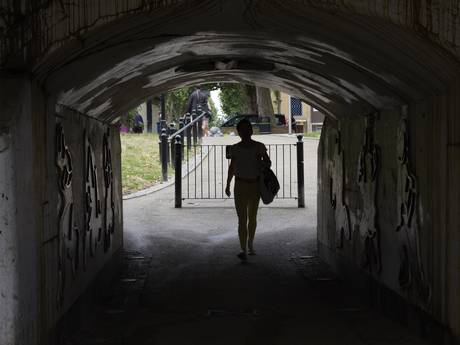Skets. Wifeys. Hood rats. The lexicon of girl gangs is almost as impenetrable as their world. So what is it that draws them to a life of sexual brutality and violence?
Chloe Combi
The Independent
August 7, 2013
 The summer sun glowers in the sky, its rays bouncing off buildings and giving everything a sci-fi, apocalyptic quality. We have forgotten this kind of London.
The summer sun glowers in the sky, its rays bouncing off buildings and giving everything a sci-fi, apocalyptic quality. We have forgotten this kind of London.
Cars throbbing with deep bass pass by. People wander aimlessly, the oppressive mugginess robbing them of any real ambition. In some parts of London, the tension rises with the heat: the urban surroundings seem to hold their breath, perhaps waiting for the more familiar rain and breeze.
Sweat trickles down the face of a girl talking to me. She is dressed, like all of her friends, as a carbon copy of Rihanna – scanty shorts, high-top trainers, designer sunglasses, enormous gold earrings. She looks older than her 15 years.
She leads what she describes as a “crew” (I agree to keep its moniker a secret). She and her “crew” avoid the term “gang” because they dislike its negative associations with criminality, although this “crew” sometimes commits crimes (“Mostly robbery and dealing”).
Having spent several weeks investigating the little understood world of female gang culture, one thing I know for sure – this is an arena where any label is dangerously simplistic.
She is explaining something to me in a weirdly sing-song tone completely at odds with what she is saying. It interests me, because it confirms how readily (and at such a young age) the girls are adopting and internalising labels that are both negative and imply male ownership. It also says a lot about how the girls view each other. As one academic told me “girls in gangs very rarely operate on the politics of a sisterhood”. In fact there is fierce internal conflict, frequent reports of girl-on-girl betrayal and of course competition to be the most (sexually) attractive to the men who orbit their world.
“There are wifeys, girlfriends, skets and hood rats,” she says. “We are called worse things, but let’s not go into that. Wifeys and girlfriends are what you want to be. It means you’re special to your man. You will get respect. If he is respected, no-one will f*** with you. You also might get stuff.”
“Like what?” I ask.
“Presents,” says another girl, sporting so much red lipstick it makes her look like she has been punched.“Presents,” she emphasises, noisily chewing the hell out of some gum.
“So what’s better? Being a wifey or a girlfriend?” There is a loud debate over the relative merits of the accolades. The general consensus is that either one is pretty great.
“So what about skets and hood rats? What’s the difference?”
There is further loud debate. Either term is pretty unflattering: you are considered, in the estimation of this lot, unworthy of little else but being passed around the men as a kind of cheap sexual currency. “But seriously, is there any difference?” I ask.
“A sket will probably have more STDs,” shrieks another elaborately dressed girl. “A hood rat will probably have more kids.”
I ask the questions to this (comparatively) tame bunch carefully. Over the last few weeks, I have learnt to ask in general, not specifics. You don’t ever frame questions in the personal: were you abused? Have you been raped? Do you commit crime? Where are your mum and dad? You begin with “Do you know of. . . .?” Sometimes you get the truth. Sometimes, you suspect, you get exaggeration or lies. Sometimes you get personal anecdotes told with curled lips and glittery eyes and sometimes it’s somebody’s “friend”.
But I do feel it’s OK to ask them why they don’t consider themselves to be “gang members”.
“A crew is more about protection. A gang is more about crime,” says a girl in a lurid sports hoodie and crop top who looks pregnant.
“Who do you think you need protection from?” I ask.
“Other crews,” says the girl.
I push the girls a bit on the subject of how they are treated by the men in their world. They’ve been happy enough to discuss guns (“handled ’nuff guns”), drugs (“sometimes we take them, but we mostly deal them. Junkie girls are always skets”) and stealing (“I was 11 during the London riots, but yeah I was there and I held some stuff”).
Mention the widely reported dangers men can represent to these girls – exploitation, rape, pimping – and the curtain goes down. They simply won’t be drawn on the subject.
 Daily Stormer The Most Censored Publication in History
Daily Stormer The Most Censored Publication in History


